
Guests
- Rashid KhalidiPalestinian American author and historian, the Edward Said professor emeritus of modern Arab studies at Columbia University.
Rashid Khalidi, the renowned Edward Said professor emeritus of modern Arab studies at Columbia University, says he is withdrawing from teaching his fall course after the school has agreed to pay a $200 million settlement in a major new deal with President Trump, who accused the university of failing to protect Jewish students during campus protests against Israel’s assault on Gaza. Columbia will also pay $21 million to settle investigations brought by the U.S. Equal Employment Opportunity Commission and agreed to end the consideration of race in admissions and hiring. Columbia has accepted values that “are dear to people who want to protect Israel from criticism at all costs while it slaughters people by the hundreds daily,” says Khalidi. In his piece in The Guardian, he wrote, “The university’s draconian policies and new definition of antisemitism make much teaching impossible.”
Transcript
AMY GOODMAN: This is Democracy Now!, democracynow.org, The War and Peace Report. I’m Amy Goodman.
One by one, major universities have been making deals with the Trump administration. In the most comprehensive of all the deals with schools so far, Columbia University recently agreed to pay a $200 million settlement to the Trump administration after it accused the university of failing to protect Jewish students during campus protests against Israel’s assault on Gaza. Columbia will also pay $21 million to settle investigations brought by the U.S. Equal Employment Opportunity Commission, the EEOC, by agreeing to end the consideration of race in admissions and hiring.
The settlements will restore hundreds of millions of dollars’ worth of canceled or frozen grants from National Institutes of Health and Department of Health and Human Services. As part of the deal, Columbia also agreed to appoint a senior provost to oversee the Middle East Studies Department, will further crack down on campus protests and will appoint three dozen new security officers with arrest powers. The agreement includes a little-reported provision that commits Columbia to, quote, “examine its business model and take steps to decrease financial dependence on international student enrollment.”
For more on this major settlement, we’re joined by Rashid Khalidi. He’s the Edward Said professor emeritus of modern Arab studies at Columbia University and author of several books, including The Hundred Years’ War on Palestine. He has a new essay in The Guardian. It’s headlined “I spent decades at Columbia. I’m withdrawing my fall course due to its deal with Trump: The university’s draconian policies and new definition of antisemitism make much teaching impossible,” he wrote.
In the piece, Khalidi explains why he now finds it impossible to teach at Columbia, given its adoption of International Holocaust Remembrance Alliance, or IHRA’s definition of “antisemitism,” and cites parts of his lecture that would run afoul of it. Khalidi writes, quote, “The IHRA definition deliberately, mendaciously and disingenuously conflates Jewishness with Israel, so that any criticism of Israel, or indeed description of Israeli policies, becomes a criticism of Jews. Citing its potential chilling effect, a co-author of the IHRA definition, Professor Kenneth Stern, has repudiated its current uses. Yet Columbia has announced that it will serve as a guide in disciplinary proceedings,” unquote.
Khalidi also writes in the piece, quote, “It is not only faculty members’ academic freedom and freedom of speech that is infringed upon by Columbia’s capitulation to Trump’s diktat. Teaching assistants would be seriously constrained in leading discussion sections, as would students in their questions and discussions, by the constant fear that informers would snitch on them to the fearsome apparatus that Columbia has erected to punish speech critical of Israel, and to crack down on alleged discrimination,” unquote.
Professor Rashid Khalidi joins us now from France.
Professor Khalidi, welcome back to Democracy Now! We’ve read some of your rationale. I’m sure there are hundreds of students who are extremely disappointed to hear that you’re not going to be teaching this course. Though you did retire, you were continuing with this course. Can you more fully explain why you’ve said no to Columbia?
RASHID KHALIDI: Well, you already laid out — thanks for having me, Amy, again. I’m sorry that for 22 months you and I have been talking about the same genocide. And that’s the background to my decision. You’ve already mentioned a couple of the reasons that I gave. Columbia has agreed to a number of conditions that the Trump administration wanted to impose. You mentioned some of them. Another of them is the imposition of an outside monitor, so called, who will have access to absolutely everything, including classrooms, meetings and so forth, to ensure compliance with the various diktats of the Trump administration. Basically, it’s going to be impossible to teach a whole range of topics, not just including modern Middle East history or the history of Palestine or Israel, but things like genocide, things like settler colonialism, things like the Holocaust.
One of my distinguished colleagues, a Holocaust scholar, Marianne Hirsch, has just mentioned in an interview that she’s not going to be able to teach. She’s also retired, but, like me, was also teaching a course, in fact, I believe, on the Holocaust. And she said, “I cannot teach this course under the IHRA definition,” because it makes it almost impossible to say certain things which are critical of either Zionism or Israel. She said, “How can I teach Hannah Arendt?” Hannah Arendt, one of the great figures of the 20th century, was an anti-Zionist. She’s also one of the great commentators and writers about the Holocaust. She said, “I can’t teach Hannah Arendt. Somebody’s going to come and lodge one of these spurious complaints under this new dispensation, and I’m going to be brought up before a kangaroo court.” And that’s essentially what Columbia has agreed with the Trump administration to establish, as has already happened to her and as has happened to a number of my colleagues.
And so, I figured I had to take a stand. I mean, they have been putting pressure on faculty and students, really, since the war began, to shut down any advocacy for Palestine, any opposition to this horrific genocide. You ran a piece at the very beginning of this segment where you quoted a speech that I gave a year ago talking about how the students are on the right side of history. They are. A year later, it’s even more true. The starvation, the mass death, the extraordinary callousness that Israel has shown have been exposed to the world. You don’t have 300,000 people crossing Sydney Bridge in Australia unless they realize that something horrific is happening at the hands of Israel. So, I realized that I cannot simply — I simply cannot teach under these circumstances in this institution.
The last thing I want to say is this is not just a capitulation to the Trump administration. This was an inside job. There was a fifth column, members of the Board of Trustees, senior members of the faculty of some of the professional schools, and a clutch of donors, who have been beating the drums for years and years, more than a decade, to the effect that Columbia is deeply, profoundly antisemitic. This is a — this is a despicable lie. It simply means that their sensibilities and their unbounded support for Israel are offended by the fact that some people are sticking up for Palestinian rights. This is not a new phenomenon at Columbia. This fifth column working from within, within the Board of Trustees, among a minority of the faculty, and a few students, have been trying to get Columbia to do these things. In fact, one of them admitted it. She said, “I’m glad we’ve been forced to do this. These are things we wanted to do all along.”
AMY GOODMAN: I wanted to go back to your essay, where you said, “Citing its potential chilling effect, a co-author of the IHRA definition, Professor Kenneth Stern, has repudiated its current uses.” Talk more about that.
RASHID KHALIDI: Well, Ken Stern was one of the people who helped to write this, and he intended it for an entirely different purpose, not to be used to punish speech in support of Palestine, not to be used to punish people who say certain things about Zionism, things that have been said by leading Jewish intellectuals for over a hundred years. He never, never intended that the definition that he helped to co-author would be used for these purposes, to discipline and punish academics and students and others.
And that is the way it has been weaponized, as a tool to protect Israel from criticism, as a tool to protect this political ideology of Zionism from criticism, by arguing that any criticism of Israel, or virtually any criticism of Israel, and virtually any criticism of Zionism are antisemitic, that they are directed at the entirety of the Jewish people, which is, of course, nonsense, because the majority of the Jewish people didn’t even support Zionism until about a hundred years ago, or even less than a hundred years ago. Majorities of them were opposed to Zionism. Most anti-Zionists were Jewish up through the middle of the 20th century.
But this definition has been concocted by the International Holocaust Remembrance Association not in order to remember the Holocaust, to prevent any criticism, or many criticisms, of Israel and of Zionism. And that is what Ken Stern was objecting to, and he’s been objecting to it quite vigorously. I understand that he spoke to the Board of Trustees, at their invitation, to try and persuade them not to take this step. And, of course, that had no impact on them.
AMY GOODMAN: And, of course, many of the protesters across the country and at Columbia are Jewish. I wanted to get your response to the acting Columbia president, Claire Shipman, speaking to the Columbia Daily Spectator, the student newspaper. She defended the deal with the Trump administration, saying, quote, “I think we were able to craft an agreement that is in line with our values and doesn’t cross any of the red lines we articulated. So I understand that narrative, and as a former journalist, I understand the power of narrative and I understand the power of simple narrative, but this is a very complex situation. … I think that the process we moved through is actually the right one for this institution.” Professor Khalidi, can you respond to Columbia’s acting president, Claire Shipman?
RASHID KHALIDI: I think she’s acting as a mouthpiece for what I call this fifth column within the Board of Trustees, within the donor community and among the few senior faculty in the professional schools, for whom any critique of Israel is unacceptable, certainly many critiques of Israel are unacceptable, and any or many critiques of Zionism are unacceptable.
I don’t think that the values of Columbia include a government-appointed monitor from a company that in June celebrated Israel’s independence, or celebrated Israel, to be able to go into classrooms, to be able to go into meetings, to be able to harvest our data. If that’s the value that Columbia stands for, it’s a Stasi value. It’s a dictatorial value, where the government appoints a monitor to check on what is happening inside an independent, private university. What values are protected by the IHRA definition? The only value that’s being protected is Israel’s impunity as it commits genocide.
There are many other — there are many other aspects of the settlement, the appointment of a special provost, a vice provost. Why does Middle East studies require scrutiny? What’s wrong with what’s being taught at Columbia? These are enormously popular courses. They represent the scholarship of a vast array of people, not just the people teaching at Columbia. They represent, basically, the most respected scholarship in the field. There’s no need for a vice provost to supervise Middle East studies at Columbia, any more than there’s a need for it to supervise — this is intended, by the way, to go further and to cover other area studies. And undoubtedly, as the Trump administration squeezes and squeezes, we’ll be talking about race, we’ll be talking about gender, we’ll be talking about Columbia’s expansion into Harlem at the expense of the local community. Those things are going to be verboten. You’re not going to be allowed to speak about race, you’re not going to be allowed to speak about gender, just as you’re soon not going to be allowed to speak about — you’re now not allowed, under these rules, to speak about certain aspects of Israel and Zionism.
AMY GOODMAN: I wanted to compare Columbia’s response to Harvard. This is in The Harvard Crimson. Harvard President Alan Garber “has told faculty … a deal with the Trump administration is not imminent … denied … the University is considering a $500 million settlement, according to three faculty members familiar with the matter. The University is seriously considering resolving its dispute with the White House through the courts rather than a negotiated settlement, Garber said, according to [these] three faculty members.” Your response, Rashid Khalidi?
RASHID KHALIDI: Like Columbia, Harvard practiced anticipatory obedience, closing down an exchange program with Birzeit University — this happened months ago — firing the two people who head the Middle East Center, shutting down a program at the Divinity School related to Palestine. They have already kowtowed. They have already done what was asked of them. They’ve already accepted IHRA. The same draconian strictures on speaking about Israel and on speaking about Zionism were already adopted by Harvard, even before Columbia adopted them.
So, Garber’s tough talk relates basically to money, which, incidentally, is the value that these universities cherish above all else. Their contempt for their students, their contempt for their faculty is unbounded. Their attention to the bottom line is unlimited. And that’s one of — that’s the reason I decided to retire several years ago, long before the war in Gaza, long before any of this happened. I saw an institution that was not driven by pedagogical and educational values, an institute that had contempt for its community, that had contempt for its students, that had contempt for its faculty, and was led by people none of whom in the Board of Trustees, with one or two possible exceptions, knows anything about education. They’re a bunch of hedge fund managers, government bureaucrats and lawyers. With all respect to those three categories, they don’t know squat about education. And those are the people who are leading Columbia and most other private universities — politicians, ex-politicians, government bureaucrats, lawyers, hedge fund managers and so forth.
And those are the people who have decided, for whatever reason, whether because they sympathize with an attempt to shut down any kind of protest against Israel’s genocide, or whether they really don’t want the faculty — I mean, one of the things that they have promised the Trump administration here at Columbia is to restructure governance so the faculty and the Senate are excluded from any aspect of governance. They’ve already been excluded from the disciplinary process. You have a bunch of kangaroo courts, led by faceless, nameless bureaucrats, investigators who know nothing about education, who have condemned student after student, faculty member after faculty member, on ridiculous, spurious grounds, in some cases kicking them out of the university. In the case of one of my colleagues, she was forced to leave her position at the law school. In the case of students, withdrawing or preventing them from getting their degrees or suspending them for two years, including suspension of their funding.
So, we are talking about a situation in which, really, Columbia University has accepted a set of values that have nothing to do with the values that Shipman talked about. They’re values that are dear to a dictatorship. They are values that are dear to censors. They are values that are dear to people who want to protect Israel from criticism at all costs while it slaughters people by the hundreds daily in Gaza, one child every day over more than 600. I mean, it’s extraordinary, the largest number of children killed in a conflict, the largest number of medical workers killed in a conflict, the largest number of journalists killed in a conflict in the 21st century. And they want to protect that, with IHRA, with their monitor, with their vice provost, with their kangaroo court disciplinary procedures.
I don’t see how people can, in good conscience, continue as before inside these universities. People really have to do something. It was easy for me. I’m retired. I simply decided not to teach a course that I didn’t have to teach in any case. But it’ll be harder, obviously, for people who depend on their salaries, for people whose careers will be affected. But I really do think that things have gotten to the point where people have to stand up and do more than any of us have done. I mean, people have tried to stop this genocide. The students were enormously heroic. Hundreds of them have paid very high prices, in terms of expulsion, suspension, traumatic disciplinary procedures. Many of the students I know have been very severely psychologically harmed by the brutality of Columbia’s crushing repression. They’ve sacrificed.
I think it’s time for other people to sacrifice. And by that, I don’t just mean people in academia. I mean everybody, people in the complicit news media. The mainstream news media are complicit in genocide by, for example, publishing anything that the Israeli military spokesman says. They’re inveterate liars. They should be called out for that when it is proven that what they’re saying is an absolute lie. The media should be saying that. On the contrary, the reverence for anything an Israeli official says is nauseating. These people are committing genocide. You would not have reverence for the government of Myanmar or for the Rapid Support Forces in Sudan as they slaughter people. Why are we reverently repeating in the media the lying statements of Israeli officials? There’s a lot more that needs to be done by everybody.
AMY GOODMAN: I wanted to get your response. I’ve seen this going around online, that there’s going to be a spontaneous memorial for the first concrete academic casualty post-deal — in parentheses, Khalidi’s class — outside the campus on Broadway north of 116th at noon today. Your thoughts on this?
RASHID KHALIDI: I hadn’t heard about that. One of the things that I mentioned in the article that I wrote for The Guardian was that I will be teaching a free, hybrid short course on Palestine, which will summarize a chunk, but not all, of what I was going to teach in this course at Columbia. I’ll be doing that in New York at The People’s Forum, time and date and details yet to be — yet to be arranged. So, I will be teaching this fall, but not at Columbia. And I will continue to teach elsewhere, maybe not in the halls of corrupt academia, maybe elsewhere. So, I think it’s a little early for a postmortem.

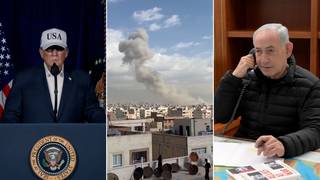

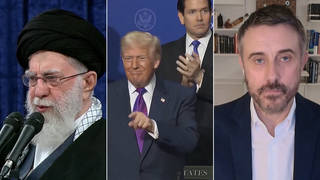
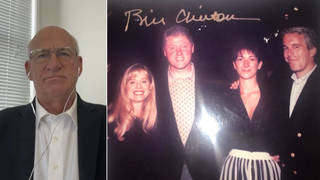




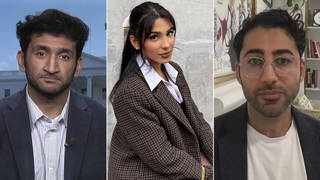
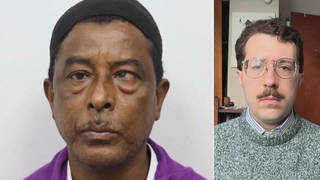

Media Options